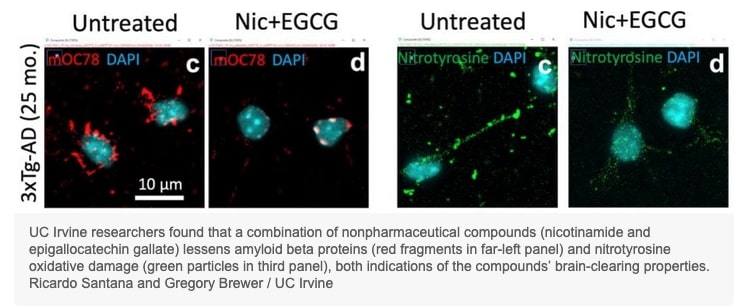In a paper published recently in the journal GeroScience, the UC Irvine team reports that a combination of naturally occurring compounds – nicotinamide (a form of vitamin B3) and epigallocatechin gallate (a green tea antioxidant) – can reinstate levels of gua…
Why it matters
- Recent research highlights the potential of everyday compounds in promoting cognitive health.
- The combination of nicotinamide and epigallocatechin gallate may provide a novel approach to tackling age-related cognitive decline.
- This study opens avenues for further exploration into dietary interventions for brain health.
A recent study published in the journal GeroScience by researchers from the University of California, Irvine, has unveiled exciting findings regarding the enhancement of brain health through the use of naturally occurring compounds. The focus of the study is on nicotinamide, a form of vitamin B3, and epigallocatechin gallate (EGCG), a powerful antioxidant found in green tea. The researchers found that these two compounds could effectively restore levels of a critical molecule known to support cognitive functions, which tends to decline with age.
The aging process often brings about a multitude of changes in the brain, including a decrease in the levels of nicotinamide adenine dinucleotide (NAD+), a coenzyme that plays a vital role in energy metabolism and cellular health. This decline in NAD+ is associated with various neurodegenerative conditions and age-related cognitive decline. The researchers aimed to investigate whether supplementing with nicotinamide, in conjunction with EGCG, could reinstate NAD+ levels and, as a result, improve brain health.
To conduct their study, the UC Irvine team utilized a combination of in vitro experiments and animal models. The results were promising, showing that the administration of nicotinamide and EGCG led to a significant increase in NAD+ levels in the brain. This increase is believed to help improve overall brain function and potentially mitigate the cognitive decline often seen in older adults.
Dr. Michael E. D. Huber, a lead researcher in the study, noted that “these findings suggest that a simple dietary intervention could have profound implications for brain health as we age.” The implications of this research extend beyond just theoretical benefits. If confirmed in further studies, these findings could pave the way for new dietary recommendations and interventions aimed at preserving cognitive function in the aging population.
Moreover, both nicotinamide and EGCG are already widely available in dietary supplements and green tea, making them accessible options for individuals seeking to enhance their cognitive health. This research aligns with a growing interest in the role of nutrition and natural compounds in maintaining health and wellbeing, particularly as we age.
The study also highlights the potential for further research into the synergistic effects of these compounds. While the initial findings are promising, the researchers emphasize the need for more extensive clinical trials to fully understand the mechanisms at play and the optimal dosages required for effective cognitive enhancement.
In addition to its implications for cognitive health, this research contributes to the broader field of geroscience, which investigates the biological processes of aging and how to intervene in these processes. By identifying compounds that can positively influence brain health, the study aligns with a growing body of evidence suggesting that lifestyle choices, including diet and nutrition, play a crucial role in aging well.
As the global population continues to age, the findings from this study could not only influence individual health strategies but also inform public health policies aimed at improving the quality of life for older adults. The potential to leverage simple dietary changes to promote better cognitive health could alleviate some of the burdens associated with age-related cognitive decline.
In conclusion, the research conducted by the UC Irvine team represents a significant stride in understanding how natural compounds can enhance brain health. As interest in the intersection of nutrition and cognitive function continues to grow, studies like this will be pivotal in shaping future approaches to aging and health management.











